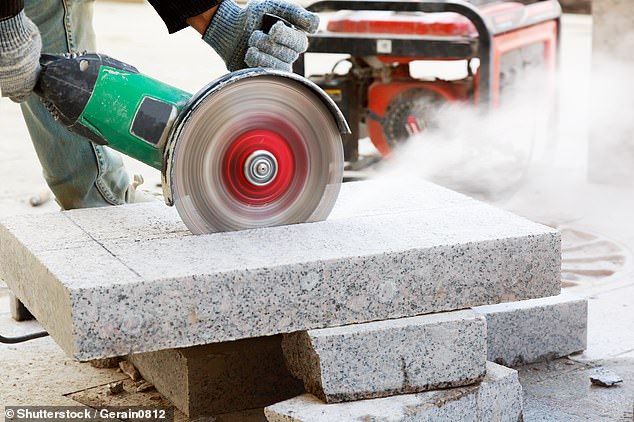‘Modern-day asbestos’ is finally banned in Australia: Engineered stone that put tradies at risk of deadly disease will be outlawed
Processed stone products will be banned nationwide to protect workers from developing fatal health problems.
The ban will come into effect from July 1, following an agreement between federal, state and territory workplace ministers at a meeting on Wednesday.
Artificial stone, which is commonly used in kitchen worktops, has been called a modern-day asbestos, with workers who used the product often developing the incurable and fatal lung disease silicosis.
As part of the national measure, the federal government has indicated it will introduce a ban on the import of artificial stone into Australia.
Joshua Suwa cannot work as a stonemason due to a diagnosis of silicosis
A statement from the meeting said a transition period should be introduced for artificial stone contracts entered into before the ban was announced.
The timetable for the transition period will be agreed when ministers meet again in March.
Exceptions are made for the removal or repair of already applied natural stone.
CFMEU national secretary Zach Smith said the national ban was significant.
“It is an important victory for the thousands of workers who have been forced to use this product, which has left them with life-threatening silicosis,” he told reporters in Canberra.
“This decision taken today by the various levels of government will save lives.
'We know that as many as one in four workers who use artificial stone contract silicosis.'
The CFMEU had previously said it would introduce its own ban from July next year if the government did not act.
Mr Smith said measures are still needed to protect workers from previously installed stone products.

Processed stone products will be banned nationwide to protect workers from developing fatal health problems (file photo)
“Our union is advocating for a system similar to the way we deal with legacy asbestos issues,” he said.
“There is a lot of this product in Australian homes, in Australian apartments and commercial spaces, and it is important that people are properly trained and qualified to handle this product in the future.”
Employment ministers also noted that businesses and consumers should note that they will have to enter into new contracts with artificial stone from January 1 to avoid work that may not take place.
The national ban was approved following a Safe Work Australia report, commissioned by workplace ministers, which called for a nationwide ban.
While such a ban was considered the most expensive option in the report, the report said it would protect workers from developing health problems.
Safe Work Australia CEO Marie Boland said the organization would take immediate action to implement safety measures ahead of the implementation of the ban.
“Workplace exposure to respirable crystalline silica has led to an unacceptable increase in cases of silicosis and other silica-related diseases,” she said.
“This ban will make Australian workplaces safer and healthier.”
Hardware chains Bunnings and Miter 10 said they would phase out sales of the product.
Public Health Association of Australia CEO Terry Slevin said more work was needed to support those affected by silicosis.
“This is an important day to celebrate, but it is also a call to action to work harder to reduce the known burden of those exposed to silica in their daily work,” he said.
'Engineering stone is the most obvious and obvious example of a dangerous product.'
